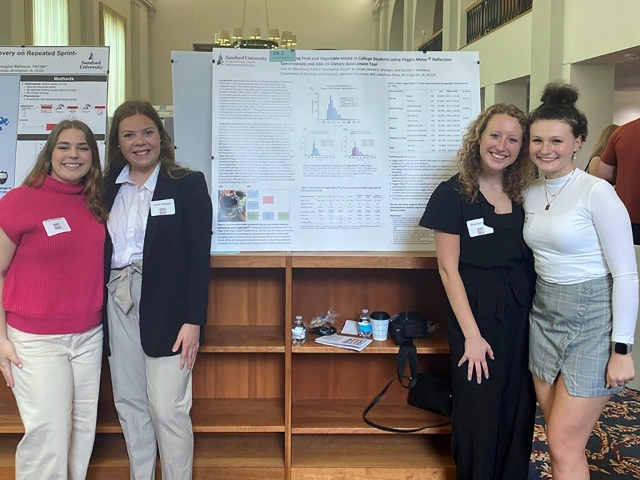
Each year, Samford University students offer a fresh perspective on research—colloquially speaking.
The second annual Samford Student Research Colloquia, held April 21, saw undergraduate and graduate students from various disciplines across campus gather to present their scholarship and research in a public forum.
Featuring 156 students and 95 poster presentations, the 2023 event showcased students’ independent and collaborative research on a breadth of topics, from biology to social work and nearly all points in between.
“Our students have so much creativity around the topics they think about—things we take for granted,” said Linnea Minnema, event organizer and director of grants and sponsored programs in Samford’s Office of Research. “They have a genuinely fresh perspective on research.”
Poster presentations are judged by faculty members, based on such criteria as purpose, findings, implications, context, contribution and methodology. And according to Minnema, the students did not disappoint.
Nineteen students and 11 presentations were celebrated as winners, with each winning student receiving a $100 Amazon.com gift card.
Senior nutrition and dietetics majors Eliza Burnham, Katie Hynekamp, Elise Marchand and Aimee Metzger were among them. Their project aimed to assess fruit and vegetable intake among undergraduate college students.
To do so, they worked with 315 Samford students who completed a health and demographic survey before undergoing physical assessment with a Veggie Meter, a noninvasive research-grade instrument that detects and quantifies carotenoids in the skin.
“We found that females, upperclassmen (juniors and seniors), health science majors and those who were physically active or very active had a higher fruit and vegetable intake and were statistically significant,” Hynekamp said. “Overall, this study suggests that gender, physical activity, choice of majors and class may influence intake of fruits and vegetables in undergraduate students.”
Although the four nutrition majors were excited to win, they were also grateful for the opportunity.
“The Student Research Colloquia will benefit us professionally by giving us an insight into how our research fits into research as a whole,” Marchand said. “It gave us a chance to see other types of research conducted by our peers and how each department plays a significant role.”
Further, with more than 400 guests in attendance, the students gained experience in presenting and expounding on their topics.
“The feedback we received from judges and other faculty was beneficial to our development in research and allowed us to see where we could go with it in the future,” Marchand added.
For Burnham, Hynekamp, Marchand and Metzger, that future includes the American Society of Nutrition’s annual conference in Boston, Massachusetts, where they will present this summer on the same topic.
Minnema said the excitement was palpable—and not just among students.
“I couldn’t stop smiling,” she said. “It gave me goosebumps, seeing all these disciplines coming together and celebrating our students. These students are just so talented.”
The 2023 Samford Student Research Colloquia Winners are:
Undergraduate
- Taryn Adams, Jenny Johnson (Division of Music/Communication Sciences and Disorders)
- Elizabeth R. Flood, Lydia A. Hubbard, Parker A. Tamucci, Eleanor J. Todd (Chemistry)
- Kathryn Hoppers, Jillian Hart (Kinesiology)
- Kara Hummer (Kinesiology)
- Joseph Kelly (Biology)
- Shelby Kuck (Biology)
- Elise M. Marchand, Katie E. Hynekamp, Eliza P. Burnham, Aimee E. Metzger (Nutrition & Dietetics)
- Jake Moultrie (Computer Science)
- Sarah Westmoreland (World Languages & Cultures)
Graduate
- Ellie Johnson (Social Work)
- Stephanie Waldrep (Pharmacy)
The Samford Student Research Colloquia is hosted by the Research Advisory Collaborative, a campus group serving to advance and support the research and scholarship efforts of both faculty and students. Learn more here.
